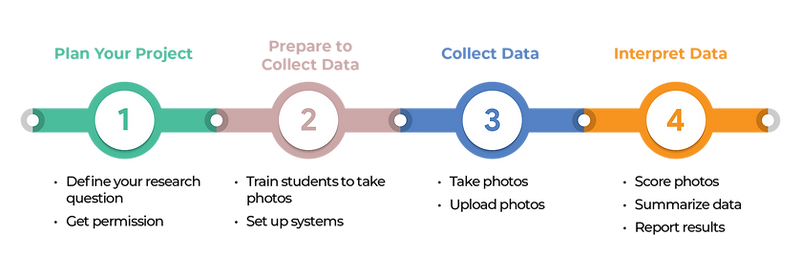AQWA:
Assessing Quality of Water AccesS
Why Assess Access to Drinking Water?
More than half of school-age children are under-hydrated, and too many routinely drink sugary beverages, making it harder for their minds and bodies to work well. Drinking water in place of sugary drinks is an important public health strategy to help all children grow up at a healthy weight and to promote good oral health.
By law, schools participating in the National School Lunch Program must provide potable water to students at no charge during mealtimes where meals are served.
Ultimately, the best water source is one that children can—and will—use. We term this effective access to water: a water source that is functional, accessible and clean.
School water source quality influences student water consumption. Furthermore, accessible vessels (such as cups) and promotional signage encourage children to take more than just a sip.

What Is AQWA?
AQWA is a validated photo-evidence tool that systematically documents water access and assesses elements of water access that we know increase water consumption. It was developed for use in schools but may be easily adapted for use in other public spaces, such as parks.
AQWA can be used by citizen scientists: students, staff or community members. This is a feasible and cost-effective way to collect accurate, usable data to measure effective access to water. Here's how it works:

WHY WE NEED OBSERVATIONAL DATA
In a study comparing self-reported data with observational data, 96% of administrators reported compliance with the requirement, while observational data revealed that just 48% of the schools made any free water available. Observational studies are not only more accurate but can also capture more detail about water source condition. The high cost of observational studies limits their size and scope.
Kenney EL, Gortmaker SL, Cohen JFW, Rimm EB, Cradock AL. Limited school drinking water access for youth. J Adolesc Health. 2016;59(1):24-29.
Patel AI, Chandran K, Hampton KE, Hecht K, Grumbach JM, Kimura AT, et al. Observations of drinking water access in school food service areas before implementation of federal and state school water policy, California, 2011. Prev Chronic Dis. 2012;9 :E121.
The AQWA Toolkit
The AQWA Toolkit package includes the following materials:
1) Plan your project
2) Prepare to collect data
3) Collect data (step-by-step photo-taking protocol)
4) Interpret data (scoring tools to generate quantitative findings)
Click here to view or download all print materials in one PDF document.
AQWA Is for Everyone!
For Schools/School Districts:
-
Pinpoint opportunities to improve water consumption in schools by building more effective access.
-
Identify schools that may need additional resources, and prioritize and plan for updates to ensure all students have equitable access to drinking water.
-
Engage students and help get them excited about science through collecting data and participating in an applied hands-on learning experience.
For Advocates:
-
Promote local change by empowering citizen scientists to use AQWA, then use the photos and data they have collected for presentation to school boards or other policymakers to advocate for improved access to water in schools, parks or other community settings.
For Researchers:
-
Provide a cost-effective way to gather valid water source data remotely by using citizens (e.g., students).
Engaging citizen scientists in assessing the quality of water in schools—and increasing student and community awareness about the importance of drinking water—can grow effective access and increase water consumption.
For more information, contact the National Drinking Water Alliance at dwalliance@ucanr.edu.

